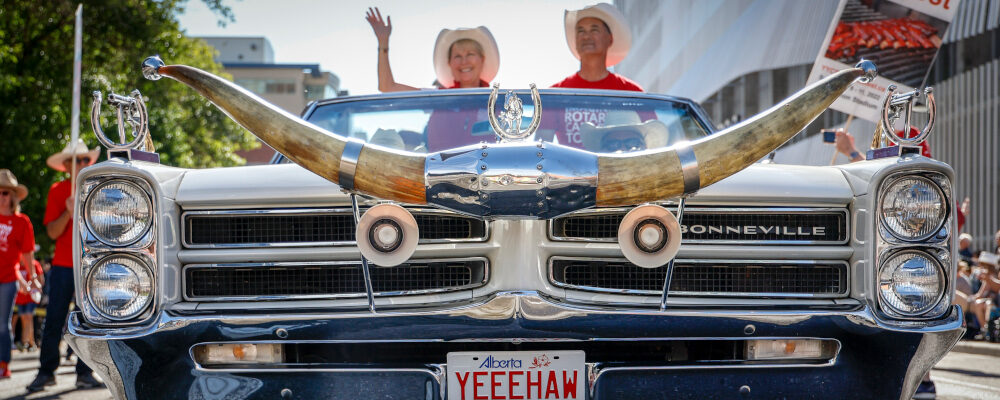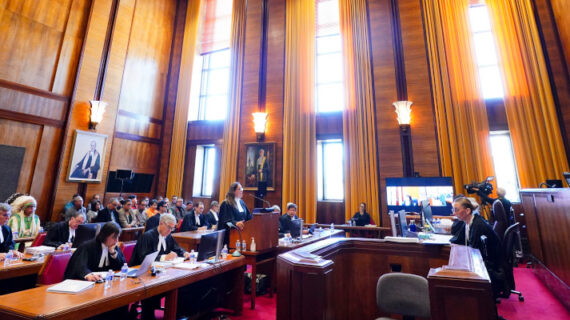Hub contributor Steve Lafleur recently penned a thorough, even-handed assessment of the ubiquitous “Alberta is Calling” campaign, written from the perspective of a young(-ish), urban white-collar professional with roots in southern Ontario (i.e.: essentially the campaign’s exact target audience).
Lafleur, who lived in both Edmonton and Calgary before returning to his native Ontario two years ago, is uniquely suited to separate the wheat from the chaff. (Steve was notably unimpressed by the world-famous Calgary Stampede, which he dismissively brands a “two-week-long outdoor corporate party”).
While acknowledging several upsides of Alberta living—including reasonable housing costs, a robust job market, and abundant outdoor recreation opportunities—Lafleur ultimately concedes that Wild Rose Country just wasn’t for him. The province’s suffocating, smoke-filled summer air was, understandably, his breaking point. He also yearned for the connectedness, cross-border travel opportunities, and big-city feel of his old stomping grounds in Toronto.
Even as I applaud Lafleur for having the moxie to spurn Canada’s most thin-skinned province so publicly (the piece was predictably ratioed on Twitter), I must point out that he overlooks Alberta’s true special sauce: its cultural and demographic proximity to the United States.
After spending most of my adult life in the states, I was forced to return to Canada this summer when my work visa expired. Distraught though I was, it was at least an easy choice for me to relocate to Calgary, which embodies the best aspects of a medium-sized American city.
Allow me to explain.
Canadians are taught from a young age to view the Great White North as morally, culturally, and politically superior to its troubled neighbour to the south. Canadian social studies curricula, newscasts, and beer commercials all perpetuate the image of the United States as a grievously ill society, plagued by systemic racism, indiscriminate gun violence, and dysfunctional politics; a country where paranoid xenophobes cling to their guns and religion while the rest of the world passes them by.
This one-dimensional caricature of the United States obscures the fact that, for many young people, it is a more bountiful, more affordable and, frankly, more fun place to be than Canada. I saw this firsthand over a decade ago when I moved south to pursue graduate studies at the University of North Carolina at Chapel Hill.
Accepting an offer to study at UNC was one of the best decisions I’ve ever made. I would have received a fine education at McGill or U of T, but I would never have experienced the UNC-Duke basketball rivalry—arguably the most heated blood feud in college athletics—from the trenches of Franklin Street. Nor would I be able to explain, in clinical detail, why North Carolina barbecue is far superior to the tripe that passes for barbecue in South Carolina (tl;dr: vinegar-based sauce > mustard-based sauce).
Our fight song is punctuated with the crescendoing lyrics “I’m a Tar Heel born, I’m a Tar Heel bred, and when I die, I’m a Tar Heel dead”. This is barely hyperbole.
As a UNC alum, I can instantly connect with a community of passionate Tar Heels in any major city in North America; a group of ready-made friends to meet up with each March for the NCAA men’s basketball tournament, clad in our trademarked school colour (Carolina blue). It’s an alumni network matched by few universities in the United States—and precisely zero in Canada.
Another advantage of UNC is its proximity to Research Triangle Park (RTP), North America’s largest centralized hub of science and technology firms. Former classmates of mine who washed out of academia now work well-paying jobs in RTP as data storytellers, user interface/experience designers, and artificial intelligence engineers; job titles that barely exist in Canada outside of a few major cities. (Raleigh, the Research Triangle’s largest urban centre, barely cracks the top 40 of U.S. cities by population).
And North Carolina’s Research Triangle isn’t even particularly unique. Virtually every state boasts at least one up-and-coming city, replete with tech start-ups, dog-friendly craft breweries, and degree-holding, upwardly mobile millennials. Places like Boise, Idaho, Santa Fe, New Mexico and Lexington, Kentucky (another former hometown of mine).
While young Canadians face a Sophie’s Choice-esque dilemma between affordability and livability, no such conundrum exists south of the border. There are plenty of spots in the states that are simultaneously hip and dirt cheap. I lived comfortably in the bohemian enclave of Carrboro, North Carolina on a $20,000 per year graduate student stipend.
One of the first things I noticed in the United States was an unmistakably young energy; a spirit that’s every bit as invigorating as it is impossible to put into words. The median American is a still youthful 38 years old (three years younger than the average Canadian) and millennials, born between 1981 and 1996, now comprise the largest segment of the country’s population (Boomers are still clinging to numerical superiority in Canada).
States now fight tooth-and-nail to attract this sizeable rump of twenty-and-thirtysomethings, who’ve started to flex their political muscles in recent election cycles. The influence of millennials (and, increasingly, Gen-Z) can be felt across every facet of American society; spanning cities, popular culture, workplaces, and politics (millennial pols Pete Buttigieg and Alexandria Ocasio-Cortez are both tipped as favourites to win the Democratic presidential nomination in 2024).
This brings me back to Alberta which, outside of the territories, is the only place in Canada where millennials outnumber baby boomers. (The median Albertan, like the median American, is a spry 38 years old). It is, as Hub contributor Howard Anglin wrote, a place that “bristles with the uncompromising vigour of youth and the entrepreneurial impatience of the newcomers who are drawn to it”. To wit, it is the only place in Canada that even remotely resembles the vibrant, millennial-dominated spaces I fell in love with over the decade I spent living in the United States.
Alberta is also Canada’s most meritocratic province; a place where one need not be born into the right family to have a shot in life. It’s no coincidence that Calgary gave Canada its first Muslim mayor and Edmonton its first Muslim member of parliament (Calgary Forest Lawn MP Jasraj Singh Hallan is likely to become Canada’s first-ever non-white finance minister if the Conservative party wins the next federal election). Indeed, Alberta is a place where elbow grease will trump family name every time.
Alberta is often compared to Texas due to surface-level similarities but, in my view, it more closely resembles a rapidly growing purple state somewhere in the middle of the country. Accordingly, Calgary could be one of any number of medium-sized cities in the Upper Midwest or Great Plains.
Calgarians are a remarkably welcoming bunch. Many of us, after all, were once newcomers ourselves (often quite recently). We’re always game to strike up a chat with a stranger; even if the conversation invariably turns to business (pro tip: never leave the house without a stack of business cards). Calgarians, by and large, have mastered the art of appearing superficially friendly while internally calculating how much personal utility they can squeeze out of each new acquaintance—the line between socializing and networking is non-existent here.
Much has been written about Alberta’s cultural similarities to the American (Wild) West, but Alberta’s demographics are really what makes it feel more American than the other provinces. Alberta is young, hungry, and dynamic in a way that parallels Utah (median age 31), North Dakota (median age 35), and the surprisingly cool Nebraska (median age 37).
Alberta certainly isn’t for everyone, but it’s undoubtedly the best place to live in Canada if you’re an ambitious thirtysomething who knows the exact number of days you have left to make a Top 40 Under 40 list (1,335 in my case).
Alberta is calling, just not on a rotary phone. Go West, young man—while you’re still young enough to crack Avenue Calgary’s rankings.




